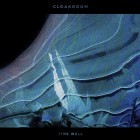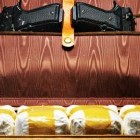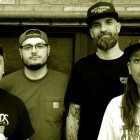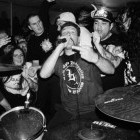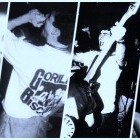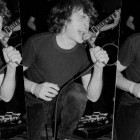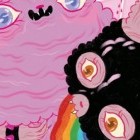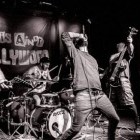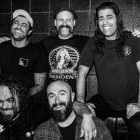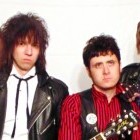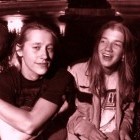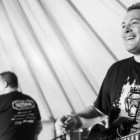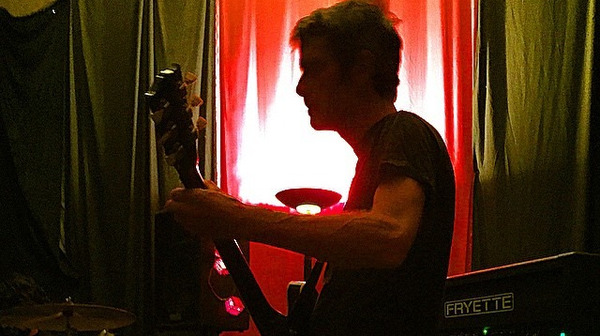
Mike Gallagher's guitar playing was first noticed by underground music fans through his time as a member of Cast Iron Hike in the mid-'90s. Releasing one album and two EPs during their three years together, the band's sound hit hard, bringing together the groove of Quicksand with the driving force of Helmet's hardest moments. After Cast Iron Hike's breakup, Gallagher joined Isis, where his guitar work and compositional contributions helped the group become one of the most critically acclaimed and influential post-metal bands of all time.
Since Isis' split in 2010, Gallagher has focused his energy on Mustard Gas and Roses, a project he began a decade ago. Now backed by a full band, Gallagher is gearing up for the release of Becoming, Mustard Gas and Roses' latest album. The eight-song full-length is a headtrip which begs to be heard on a great pair of headphones to truly experience the riches of nuances the album offers.
I recently spoke with Gallagher about Becoming, and his path to becoming a full-time musician.
I always like to start these things off by going back to the musician's childhood.
I grew up in Shrewsbury, Massachusetts. It's a fairly small town in the central part of the state. It's next to Worcester, the second largest city in New England, and considered by some to be a bit of an armpit. This was my cultural epicenter in my younger years, and I still kind of love it there. My childhood was fairly normal, running around with friends, getting into trouble, and seeing what we could get away with.
SEE ALSO: 2016 interview with Carl Skildum (Threadbare, Krakatoa, Seconds Before, Antiverse, Obsequiae).
Were your parents playing music around your house when you were a kid?
Not so much. I mostly remember my dad having Simon & Garfunkel, Liza Minnelli, and Frank Sinatra records, but I don't even remember what my mom had in the family collection. I had two sisters, five and seven years my senior. The eldest was the one who introduced me to AC/DC, and that kind of started me down the path which brought me to heavy music.
Who were some of the bands you got into when you first discovered heavy music?
Back in Black was the first record that I bought with my own money (my saved up allowances). Shortly after that, my best friend's bother introduced us to Judas Priest, so I ran out and bought Screaming for Vengeance. From there I learned about Ozzy, and I was able to see him on his 1986 tour that Metallica opened. That changed everything. I did not know what to make of Metallica's show, it totally blew me away in all the right ways. After becoming aware of and obsessed with Metallica, the floodgates opened to Nuclear Assault, Slayer, Megadeth, and so on.

What was high school like for you?
High school was not too great. Like most people, I always felt awkward and like I didn't fit in. It's funny, because I went to my high school reunion a while back and one of my classmates there was remembering how she thought I was cool in high school, and that was really puzzling to me because I always felt like a weirdo.
SEE ALSO: Journey's Greatest Non-Hits of the '80s
Were you playing in any bands at that point?
Early in high school, I was in a couple of bands. One was a rock/metal band whose only show was to play the drummer's sister's graduation party. Interesting footnote: the singer came to the show with glam metal pants with tassels. We had no knowledge of his intentions, and this was an unfortunate realization to us. However, it was very funny to us when he did a high kick à la David Lee Roth and split those pants right in the crotch, he was very embarrassed.
Amazing! I wish there was footage of that. Did you go see a ton of local shows?
Junior and senior year I was in a couple of hardcore bands that played around central Massachussetts and Boston. I discovered local shows around 1986. We would go to shows, mostly in Worcester, almost every weekend. It was really exciting seeing your friends on stage, especially when they were able to open for bands from Boston and New York.
Tell me about the way Cast Iron Hike came to be, and how you fit in.
I think it was 1992 or early 1993, I had just moved back to Massachusetts after living in San Francisco for a couple of years, and I was very eager to get a band going. I worked at a video store and [future Cast Iron Hike drummer] Dave Green would rent from there. One day I asked him if he'd be interested in playing with me. He told me he and [future Cast Iron Hike guitarist] Chris Pupecki had been writing and asked me to come down and check it out. I did, and had a blast playing with the two of them. From there we recruited [singer] Jake [Brennan] and [bassist] Pete [DeGraaf] and started playing locally.
You guys had a sound that reminded me of Orange 9mm and Handsome, but with some off-kilter rhythmic things thrown into many of the songs. What would you describe Cast Iron Hike's musical style as?
We were all pretty obsessed with the Melvins, Quicksand, and Fugazi. So, some weird combination of those bands with a healthy dose of metal would be getting close to my perception of our style. We were mostly seen as a hardcore or post-hardcore band because of our history and the bands we played with, but I always felt like we were pushing ourselves in ways that a lot of our peers were not.
Cast Iron Hike released stuff on Big Wheel Recreation and Trustkill, but the album, Watch it Burn, came out on Victory. What was that experience like? You know I had to ask!
Victory Records was alright for us. Watch it Burn came out in 1996 and we were only together for about a year after that, so we really didn't have any long-term dealings with the label. I know people have had some things to say about the label these days, but I feel like our dealings with them were brief and overall fine. I will say that working with them afforded us the opportunity of playing with bigger bands like Snapcase, Strife, and Integrity, which at the time seemed like a good opportunity.
SEE ALSO: 2016 interview with Mike McTernan (Damnation A.D., When Tigers Fight).
Why did Cast Iron Hike break up?
I'm not totally sure. Jake left the band to pursue other endeavors and we tried out a few singers, but nothing really felt right. The other guys may have something else to say about this, but I think we all just kind of ran out of gas.
After the breakup, you went on to join Isis in 1998. This was obviously a much different kind of sound from your previous work. Did you have any difficulty working your playing style into what Isis was doing, or did it come naturally to you?
It was really easy. Early on I saw Isis' influences mostly as the Melvins, Neurosis, and Swans, and that was a door that was easy for me to walk through. I had a lot of love and admiration for those bands. But, more importantly, Isis was interested in putting beauty and weirdness into heavy music and that is, and always has been, a passion of mine as well. We quickly realized that we could play off of each other very well and trust each other in our playing. This is a rare gift, and I think we were able to capitalize on that in the beginning, and more and more as time went on.
I remember noticing the crowd demographic at Isis shows widening around the time of Oceanic. You had people coming out who weren't necessarily metal fans. When did you begin to see and feel that happening?
Absolutely. It was very rewarding to be able to reach out to and affect people that may not have been fans of heavy music. I also saw it around the time of Oceanic, however, there was also another large broadening of our demographic on the Wavering Radiant tour. It was amazing to see the different types of people on that tour.
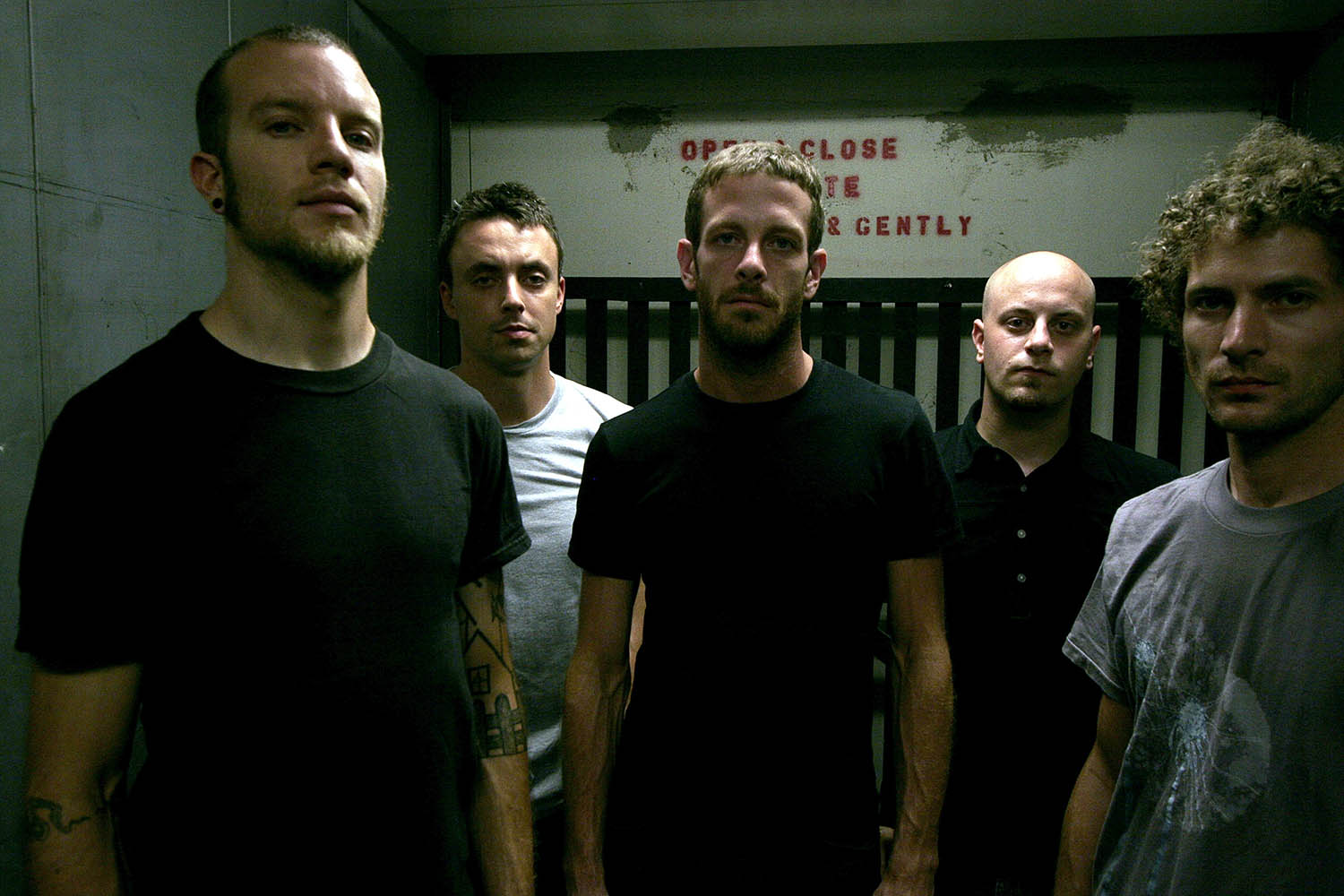
In 2005, while Isis was still in full swing, you released your first Mustard Gas and Roses record, Nova Lux. How long had you been plotting the project?
Maybe two years. I bought some recording gear and in order to learn how to use it I recorded little vignettes and layered on top of them. After some time, I started to connect the dots, and whatever didn't fit into Isis' world I would try to find a home for in all of these sketches that I had going.
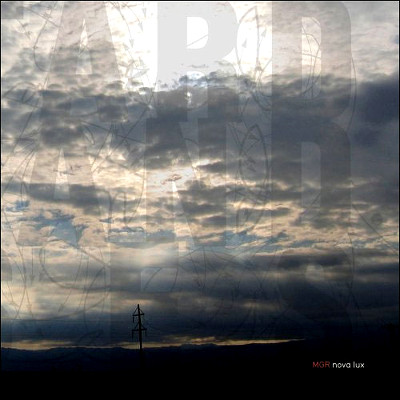
Was there a specific record or band that helped inspire the project?
At that time I was listening regularly to Friends of Dean Martinez's Under the Waves and Neil Young's Dead Man soundtrack, so I think that I found a good amount of inspiration there. It was fun for me to write music that you could put on in your car and feel like you could drive forever.
SEE ALSO: Best Bubblegum Songs of the '60s and '70s
Of the earlier Mustard Gas and Roses stuff, I really got into Wavering on the Cresting Heft. The way the arrangements slowly build and reveal themselves requires the listener's full attention, but it's worth the suspense.
It mostly starts with a core idea that is pretty simple. I'll record it, listen to it, and see where it wants to take me. From there I'll start adding parts to it and a few overdubs and then give it another listen to see if I am taking it in the right direction. Basically, I try and let the song reveal itself and tell me where it wants to go. Of course, sometimes I have to steer the ship to keep things moving, but I mostly try and listen to what the music wants.
Isis ended up disbanding in 2010. From your point of view, why did you guys decide to call it quits? Are you at peace with the way things ended?
I believe that we ended at the right time. We had an amazing run and we are all thankful for all that we accomplished. We said all that we needed to say and it was best for us to move on. I am at peace with how it ended. It was difficult and still sometimes continues to be difficult to not have the band in my life, but I have grown in a lot of amazing ways since Isis disbanded. In many ways our breakup was a challenging gift.
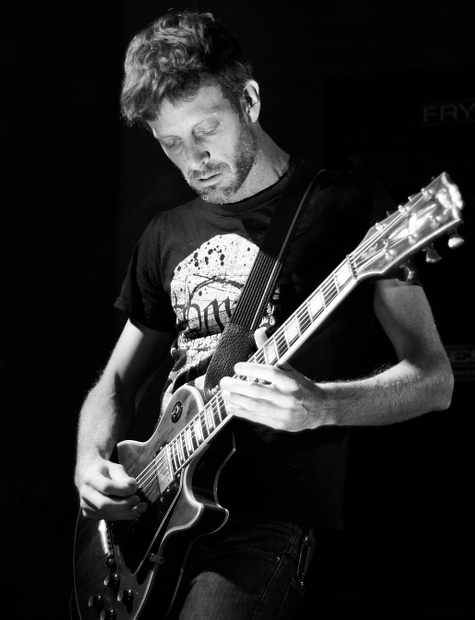
What was your favorite Isis song and why?
This answer will change from week to week, but right now it's "Threshold of Transformation." A friend recently sent me a live version of that song from Australia and I really enjoyed listening to it. It was one of the last songs that we wrote for Wavering Radiant and I really think that we found a nice balance of heavy, weird, and almost psychedelia with the song.
After taking some time off, Mustard Gas and Roses began to get busy again when you got some tour offers. Were you hesitant to make the project a full band kind of thing?
That all started in 2014. Josh Graham from A Storm of Light asked me to open for them during their spring European tour. He had expected me to do the "one-man band" thing with them, but I was missing playing with other people and asked if I could use three of the A Storm of Light guys to make Mustard Gas and Roses a whole band. So I was happy to make the project a band. I wrote about a half-hour of music and we practiced it a couple of days before we left and hit the road.
Did the other musicians on those tours have any trouble interpreting your arrangements?
At first I was kind of precious about the other musicians playing arrangements as I wrote them, but for a while now I have really encouraged all of the guys to write their own parts and pour their hearts into what they are playing.
Tell me about the current Mustard Gas and Roses lineup.
J Bennett from Ides of Gemini and Black Mare is playing bass. I've known him for about 20 years now, we met in Boston in the mid-'90s and it has been great to have him in the fold. Bryan Tulao from Chelsea Wolfe and Black Math Horseman is playing guitar. Sasha Popovic from Black Math Horseman is playing drums. I am almost always in awe of their playing. They are able to add to a song in ways that move the music into territory that I find amazing.
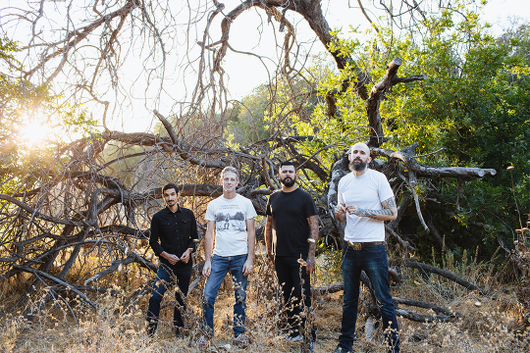
Listening to the new album, Becoming, it's clear that there's a sense of, for lack of a better word, "epicness" to much of the material, which I enjoyed. But did you worry that you might be taking the sound of the band too far from its more mediative origins?
I don't think so. Honestly, with the new record, I just wrote what I wanted to hear. Which is the same approach that I use on Mustard Gas and Roses' more meditative songs. For better or worse, I rarely go forward with a mapped out plan for my music. I just try and be true to what feels good and right to me at the time. Of course, I mold and shape it along the way to make it something that I find beautiful, but there is a lot of shooting from the hip happening in my home studio.
The standout track on Becoming is its title track. The beginning section of the song wouldn't sound out of place in a Alejandro Jodorowsky film. It's that strange and creepy!
This was the last song that was written for the record. It started off like some of the the other songs, meaning I wrote the main riff and was just kind of playing around with it for a couple of days. But for some reason I felt compelled to try and sing over the riff, this was strange because I had never really sung over my own music before. So I tried what felt like a million different variations of vocal lines and finally landed in a pretty good place. Then I put the rest of the song together and brought it to the guys. As we fleshed it out, I started thinking about having female vocals, so I approached Sera Timms (Ides of Gemini, Black Mare), CJ Leedy, and my wife, Nicole Momaney, about accompanying me on the record. They agreed, I gave them a demo, and they got together to work out what they wanted to do. We tracked it like any of the other songs, but when the ladies came in to track their vocals, they sounded like angels.
What's the plan for Mustard Gas and Roses now that you have a steady lineup and a new album out?
To play live as much as we can. I have a bunch of new stuff written, so I'd like to start working on that as well.
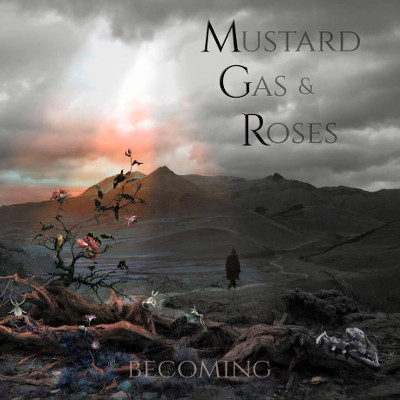
What else has been keeping you busy outside of Mustard Gas and Roses? Are you planning to do any more soundtrack work? That seems like a no-brainer for you.
Soundtrack work has been very difficult to come by. I feel like I found a unicorn having worked on 22nd of May. I have a couple of friends that are in that world and I hope to work something out with them in the near future.
Well, I think that will definitely happen for you. Closing out, I wanted to get your thoughts on some of your favorite guitarists that might not be household names. Can you point us in the right direction?
I don't really know any secrets when it comes to guitarists, but I have a lot of love for John Fahey, Neil Young, and Eddie Hazel.
***
Mustard Gas and Roses' Becoming will arrive in stores on October 14 via The Mylene Sheath, and can be pre-ordered here.
Tagged: cast iron hike, hardcore, interview, isis, mustard gas and roses, noise rock

